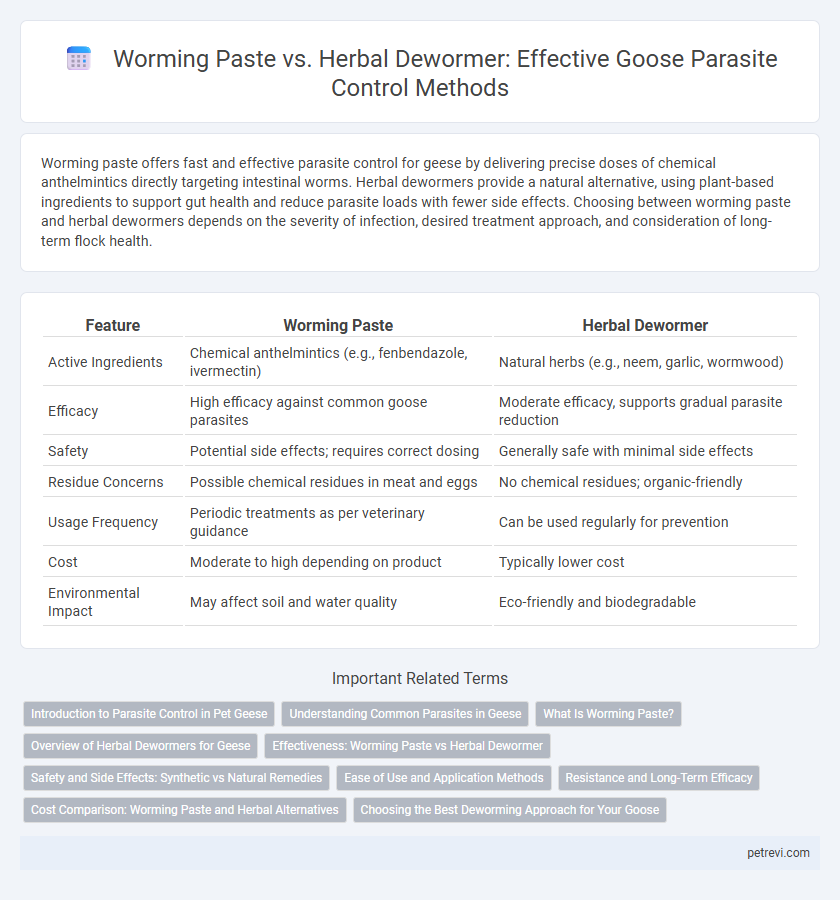Worming paste offers fast and effective parasite control for geese by delivering precise doses of chemical anthelmintics directly targeting intestinal worms. Herbal dewormers provide a natural alternative, using plant-based ingredients to support gut health and reduce parasite loads with fewer side effects. Choosing between worming paste and herbal dewormers depends on the severity of infection, desired treatment approach, and consideration of long-term flock health.
Table of Comparison
| Feature | Worming Paste | Herbal Dewormer |
|---|---|---|
| Active Ingredients | Chemical anthelmintics (e.g., fenbendazole, ivermectin) | Natural herbs (e.g., neem, garlic, wormwood) |
| Efficacy | High efficacy against common goose parasites | Moderate efficacy, supports gradual parasite reduction |
| Safety | Potential side effects; requires correct dosing | Generally safe with minimal side effects |
| Residue Concerns | Possible chemical residues in meat and eggs | No chemical residues; organic-friendly |
| Usage Frequency | Periodic treatments as per veterinary guidance | Can be used regularly for prevention |
| Cost | Moderate to high depending on product | Typically lower cost |
| Environmental Impact | May affect soil and water quality | Eco-friendly and biodegradable |
Introduction to Parasite Control in Pet Geese
Effective parasite control in pet geese is crucial for maintaining their health and preventing common internal parasite infestations such as roundworms, gapeworms, and coccidia. Worming paste, a chemical dewormer, offers rapid and targeted elimination of parasites with proven efficacy and dosage precision, while herbal dewormers provide a natural alternative with fewer side effects but may require longer usage and consistent administration. Understanding the benefits and limitations of both worming paste and herbal dewormers enables goose owners to implement an appropriate parasite control strategy tailored to their birds' health needs.
Understanding Common Parasites in Geese
Common parasites affecting geese include internal worms such as roundworms, tapeworms, and gapeworms, which can cause weight loss, respiratory issues, and reduced egg production. Worming paste offers targeted dosing with fast absorption, effectively eliminating a broad spectrum of internal parasites, while herbal dewormers provide a natural alternative, using ingredients like garlic, neem, and wormwood to boost immunity and reduce parasite load. Understanding the specific parasites and their life cycles is crucial for selecting the appropriate treatment to maintain goose health and optimize parasite control.
What Is Worming Paste?
Worming paste is a veterinary medication specifically formulated to target and eliminate internal parasites in geese by delivering a concentrated dose of anthelmintic drugs directly to the digestive system. It contains active ingredients such as fenbendazole or ivermectin, which effectively combat common goose parasites like roundworms and gapeworms. This treatment offers fast-acting and reliable parasite control compared to herbal dewormers, which rely on natural compounds with variable efficacy.
Overview of Herbal Dewormers for Geese
Herbal dewormers for geese offer a natural alternative to conventional worming paste, utilizing plant-based ingredients like garlic, neem, and wormwood known for their antiparasitic properties. These herbal remedies support parasite control by boosting the immune system and promoting overall digestive health without the risk of chemical residues. Regular use of herbal dewormers can reduce parasite load, improve flock vitality, and enhance long-term gastrointestinal wellness in geese.
Effectiveness: Worming Paste vs Herbal Dewormer
Worming paste for geese delivers targeted and fast-acting parasite control by containing specific anthelmintic chemicals proven to eliminate common intestinal worms effectively. Herbal dewormers rely on natural ingredients such as wormwood and neem, which may support parasite management but often lack comprehensive scientific validation and consistent dosing effectiveness. Choosing worming paste ensures precise parasite eradication, while herbal options offer a gentler but less predictable deworming outcome for geese.
Safety and Side Effects: Synthetic vs Natural Remedies
Worming paste for geese, typically containing synthetic anthelmintics like fenbendazole or levamisole, offers rapid and effective parasite control but may cause side effects such as lethargy or digestive upset if overdosed. Herbal dewormers, formulated from natural ingredients like garlic, wormwood, or neem, generally present a safer profile with minimal adverse reactions, making them suitable for routine use and sensitive birds. However, the efficacy of herbal remedies can vary, often requiring longer treatment periods compared to synthetic worming pastes.
Ease of Use and Application Methods
Worming paste offers straightforward administration through direct oral dosing, enabling precise control over dosage in geese, which is especially useful for targeted parasite treatment. Herbal dewormers often come in liquid or powder form, allowing for easy incorporation into feed or water, simplifying mass treatment but potentially resulting in variable intake among individual birds. Selecting between these methods depends on balancing ease of individual dosing accuracy with convenience in treating large flocks.
Resistance and Long-Term Efficacy
Worming paste for geese often contains synthetic anthelmintics effective against a broad spectrum of parasites but may lead to resistance with repeated use, reducing long-term efficacy. Herbal dewormers, derived from natural plant extracts like garlic, neem, and wormwood, offer a lower risk of resistance development but vary in potency and require consistent administration over time. Strategic rotation between worming paste and herbal options can enhance parasite control while minimizing resistance and maintaining long-term health in geese.
Cost Comparison: Worming Paste and Herbal Alternatives
Worming paste for geese typically costs between $15 and $25 per treatment, providing a targeted and fast-acting solution against common internal parasites. Herbal dewormers, while often pricier at $20 to $35 per treatment, offer a natural alternative with fewer chemical residues and potential long-term health benefits. Choosing between these options depends on budget constraints and preference for synthetic versus natural parasite control methods in geese.
Choosing the Best Deworming Approach for Your Goose
Worming paste offers targeted, fast-acting treatment with proven efficacy against common goose parasites, ensuring rapid parasite load reduction. Herbal dewormers provide a natural alternative with fewer chemical residues, supporting long-term gut health and immunity but may require longer treatment periods for effectiveness. Selecting the best deworming approach for your goose depends on parasite severity, overall health status, and your preference for synthetic versus natural parasite control methods.
Worming paste vs Herbal dewormer for Goose parasite control Infographic

 petrevi.com
petrevi.com